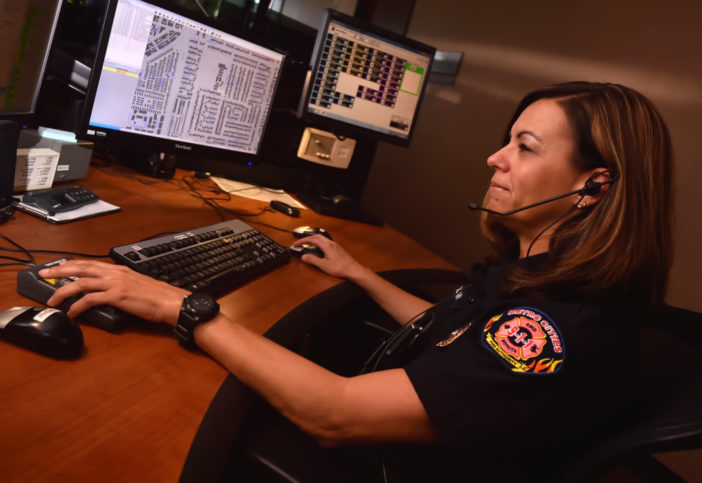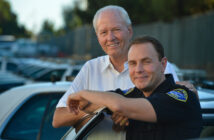In the darkened room of the Metro Net Fire Dispatch call center, dispatchers are in various stages of conversation – attempting to determine a caller’s location, narrowing down details of a situation and any of a number of other forms of information gathering.
It’s a job that requires a calm set of nerves, empathy and a high degree of multitasking.
But it’s worth it.
“It is so rewarding,” said dispatcher Tammy Ramsey, who has been working at Metro Net in Anaheim for nearly 20 years and has been a dispatcher for a total of 29. “Because you are helping somebody at a really tough time.”
Dispatchers like Ramsey across the country are being honored for their hard work in a time of crisis as part of National Public Safety Telecommunicators Week – commonly referred to as Dispatchers Week, April 9-15.
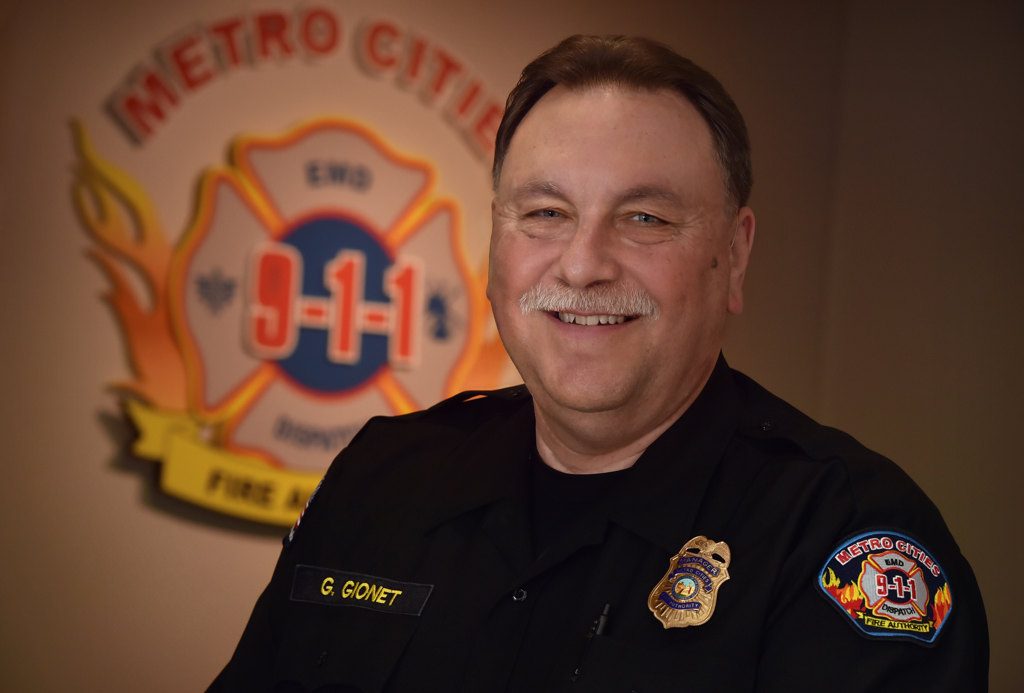
Metro Cities Fire Authority Manager Gary Gionet oversees the dispatch center in Anaheim.
Photo by Steven Georges/Behind the Badge OC
At Metro Net, which is a joint powers authority (JPA) managed by the City of Anaheim and funded by the eight member cities it serves (Anaheim, Brea, Fullerton, Garden Grove, Orange, Huntington Beach, Newport Beach and Fountain Valley), the dispatchers were celebrating with the help of balloons, bundt cakes, “free dress” days and lunches on the boss. It’s a time for a group that doesn’t always get a lot of public attention to stand in the spotlight for the important service they perform as “first first responders.”
Separate from Orange County’s city police dispatchers, calls are routed to this team from the eight cities they serve for any fire or medical emergency, according to Dispatch Manager Gary Gionet. There are three other fire and medical dispatch centers in the county – Orange County Fire Authority, Laguna Beach Fire and Costa Mesa Fire – but Metro Net is unique in that it is a JPA that is strictly a dispatch center, working in conjunction with the member cities’ fire departments such as Anaheim Fire & Rescue. It serves 210 square miles and 1.3 million people.
Because of the wide area served, the center uses an efficient computerized system that automatically routes the nearest fire truck or medic to a particular call.
“It truly is the closest resources,” said Gionet.
Fire and medical dispatchers work a little differently than police dispatchers because they require training in medical protocol. They are trained to walk callers via phone through cardiac arrests, delivering babies, assisting in choking emergencies and controlling bleeding injuries if necessary before help arrives. In cases of fire, they will also walk callers through protocols to determine the danger level of a situation – for instance, by checking if a door is hot and how to exit their home or business safely.
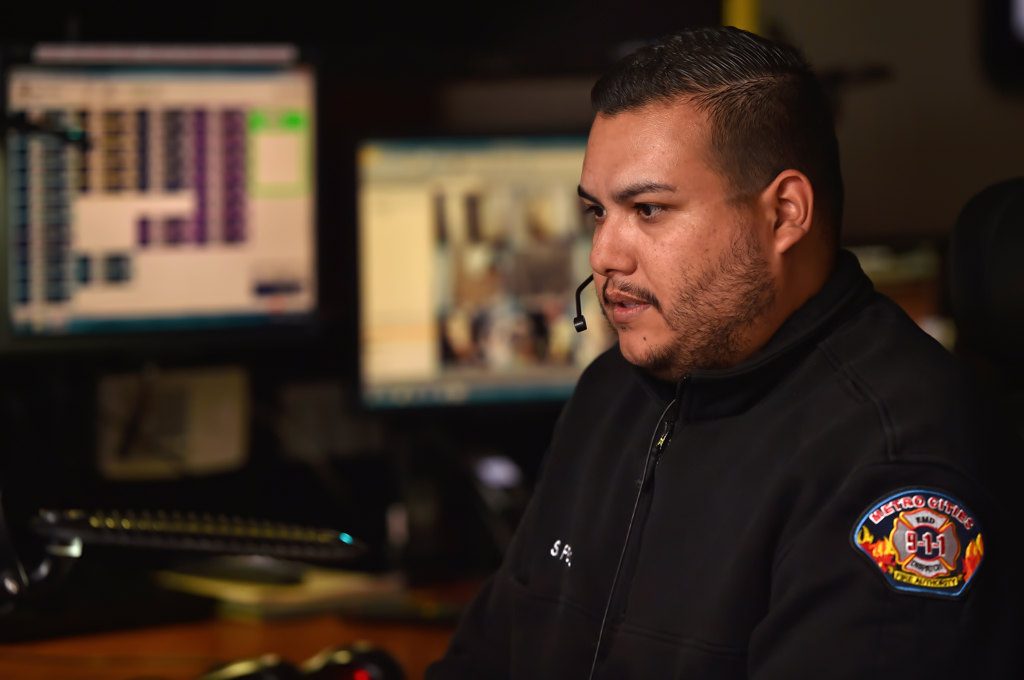
Steven Perez of Metro Cities Fire Authority takes 911 calls.
Photo by Steven Georges/Behind the Badge OC
“They go through a whole protocol with the caller regardless if it’s medical or fire or rescue,” said Gionet.
The 28 full- and part-time dispatchers, their five supervisors and five support staff at Metro Net last year dispatched 122,000 emergency calls and had 350,000 emergency telephone calls. They handled an average of 335 dispatch calls at the center a day and 83 percent of dispatched calls were medical.
The center also has a special team known as the Incident Dispatch Team, which can go remotely to situations like wildland fires and other emergencies that require dispatchers at a particular location.
Anecdotally, there’s a long list of situations the typical fire and medic dispatcher may handle. Gionet recalled the call one dispatcher received of a woman who had delivered twins at home and one had fallen into the toilet and was not breathing. The dispatcher helped the father administer CPR and the little boy survived and the parents later came in to meet the dispatcher in person (click here to read story).
Delivering babies is a frequent enough occurrence among the dispatchers that they receive a Stork Pin for delivering a baby, said Gionet. The group also hands out a Lifesaver Pin for dispatchers who assist someone through a life-threatening situation.
Calls can also be informational in nature. One thing sure to elicit callers is when the gas company off-gases wells, creating a cloud of smelly (though nontoxic) gas.
“Our lines just light up because people think it’s a gas leak,” Gionet said.
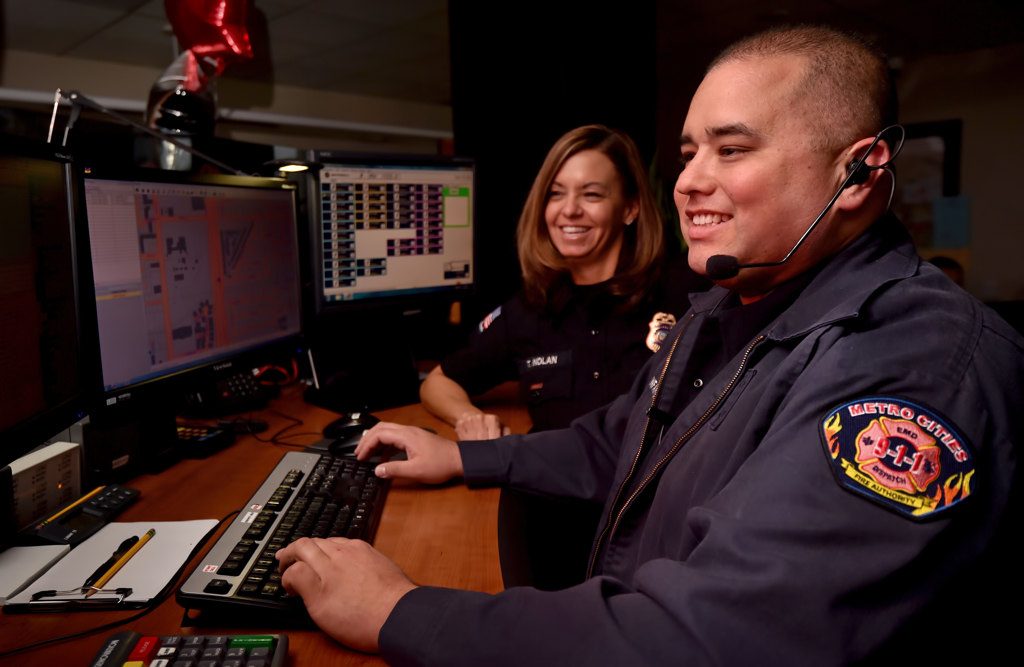
Sean Infante, Fire Dispatcher 2 for Metro Cities Fire Authority, right, works with Supervisor Tracy Nolan. Photo by Steven Georges/Behind the Badge OC
This is when agency cross-coordination and an open line of communication really is critical. The gas company typically notifies Metro Net of the upcoming venting so when dispatchers get calls, they’re able to properly inform residents.
Ramsey, who received the Lifesaving Award for helping a young man who collapsed in Brea because of congenital heart failure, said she likes “being that calm voice on the other end of the phone.” She helped talk the man’s two friends through life-saving measures until paramedics arrived.
Though Ramsey has always felt great empathy for her callers, a few years ago the job became even more personal when her own son suffered a serious head injury. She knows what it’s like to be at both ends of a call.
“I try really hard every day to say, ‘If my family called 911, would I want them to get me?’” she said.
She advises anyone considering a job in fire and paramedic dispatch to sit in at the center to see what it’s like.
“Educate yourself about the position,” she said. “Know yourself that you can handle it.”
Multitasking is key, and also being able to deal with the tough, emotional calls in a healthy way – as is being able to relate to people.
“I just try to be human,” she said.
 Behind the Badge
Behind the Badge
